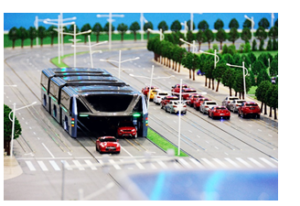So, a Few Concerns About China’s Traffic-Slaying ‘Straddling Bus’
Well blow us down: Those scrappy engineers did it. They built that crazy straddling bus a Chinese company announced three months ago, and damned if it doesn’t work. This weird wonder—officially, it’s the “Transit Elevated Bus”—gets through traffic by driving over it. And according to the Chinese news agency Xinhua, it got through Tuesday’s test drive in Qinhuangdao without decapitating a single Geely Panda.
Some specs: This thing is 68.9 feet long, 25.6 feet wide, and 15.7 feet tall. “There’s enough space on this for old ladies to have a dance performance,” wrote one Weibo user. One carriage can carry as many as 400 people, and as many as four carriages can be linked like a train following a mostly straight track. (The straddling bus does not do 90-degree angles.) They’re electric, and the designers say one four-carriage “train” could replace 40 conventional buses, cutting fuel consumption by 882 tons per year.
The Chinese definitely need dramatic answers to their traffic quandaries. China is a land of 1.35 billion people, 50-lane traffic jams, and pollution red alerts. And this is an exciting (and speedy!) engineering feat. “It’s a cool concept and I think thinking outside the box like this is a good idea,” says David Clarke, a civil engineer at the University of Tennessee at Knoxville. Still, a few things stand between our friend TEB-1 and world transit domination.
China’s First Transit Elevated Bus TEB-1 Conducts Road Test In QinhuangdaoClick to Open Overlay Gallery
The “transit elevated bus” (TEB-1) on August 3, 2016 in Qinhuangdao, Hebei Province, China.Visual China Group/Getty Images
- Whoops, There Goes Your Head
To run a straddling bus in a real-life city, you must prevent dumb drivers from doing dumb things. Although this thing is nearly 16 feet tall, it has a ground clearance of just 7 feet. (Don’t wander onto the wrong Qinhuangdao street, Kareem Abdul-Jabbar.) It’s entirely possible an SUV could get stuck underneath, and trucks? Don’t even think about it. The standard clearance for an American tractor-trailer is 13.5 feet. Keeping tall vehicles out of the way requires filtering them. Maybe those yellow clearance bars you see in parking garages? Because—roll tape—signs aren’t good enough.
The sides are a problem, too. The straddler prototype spans two lanes, riding on tracks embedded in the road. Get careless and there goes your door, friend. Engineers might prevent this with curbs delineating the straddler lane, separating traffic from the TEB-1 tracks. But that brings us to…
- How Do I Get Outta Here?
Engineers have to find a nifty way for cars to enter and exit the straddling bus lanes. Yes, you should be totally aware of your surroundings when changing lanes. But that’s not how it works in the real world. People sideswipe things all the time, and run over curbs. The TEB-1 also needs a foolproof way of signaling to cars that it is bearing down on them. “It’s like going under an underpass, except it’s a moving underpass ,” says Clarke. And is there anything worse than being stuck under a moving underpass as your exit flies by?
- The Charging Issue
She’s big, and electric. Charging will be an issue. Earlier straddling concepts featured solar panels, but those won’t keep this behemoth rolling at 40 mph. So it may use “relay charging,” picking up enough juice at each station to make it to the next one. But if something goes wrong, 300 passengers are stuck 15.7 feet in the air, in the middle of a highway. They’ve gotta get this one right.
- The Care and Keeping of TEB-1
That height creates another problem: maintenance. In the US, federal regulations require anyone working on a structure taller than 4 feet to wear safety harnesses. “If there’s no safety harnesses, you can fall and kill yourself,” says Lance Watt, a heavy truck and bus engineer. So if something goes wrong up top, it’s a whole ordeal. Furthermore: What does a bus depot look like for something this tall?
- Is It Worth It?
The straddling bus is not cheap. In May, the company behind it said each one costs $4.5 million—you can get more than 11 emissions-free buses for that. “Whether it’s commercially viable or not—that’s always the ticklish thing,” says Clarke. It’s possible, he points out, that a Bus Rapid Transit system might serve nearly the same function. “I’m not sure this is superior to regular technologies,” he says.
- It’s Not a Bus
Truly, and most importantly: The straddling bus is not a bus. It runs on a track. It’s a train.
https://www.wired.com/2016/08/concerns-chinas-traffic-slaying-straddling-bus/





